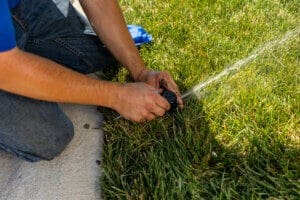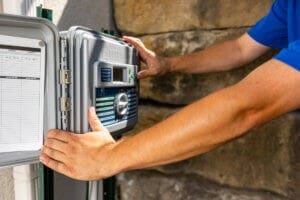Irrigation is an integral part of your overall landscaping solution, and integrating a smart irrigation system can drastically improve that solution, but what do smart irrigation systems cost? This is a surprisingly complex question that may have some surprising answers for you, depending on what your cost expectations are. We’re going to take a deep dive into smart irrigation systems, how much they cost, and what affects that cost.
What Are Smart Irrigation Systems?
An irrigation system is an automated system that controls the watering frequency and duration of your sprinkler system. Smart irrigation systems have their controller, which controls when the water comes on and where it’s sent, designed to be wi-fi and IoT (internet of things) enabled.
This lets the irrigation system become infinitely customizable. In many cases, the smart controller can even gather local weather data and incorporate the forecast into the watering plan. If it’s going to be drier or hotter than planned, the smart system will automatically adjust and will water your varying zones in the most efficient way possible.
Other smart irrigation components might include water mapping heads that spray in precise shapes instead of circle radius patterns. The water mapping heads tailer their spray to bed shapes, sidewalks, and other obstacles to prevent overspray and overwatering. Water mapping heads can save up to 80% on water.
How Much Do Smart Irrigation Systems Cost?
While there are countless factors that can affect the total cost of the system, a smart irrigation system will generally run about $8,000 to $18,000 for average residential installations. Property owners with complex properties or estates can plan to spend at least $35,000-$45,000 for smart water conservation systems, but in many cases, the water savings can pay for the system within a few years.
Factors That Can Influence Your Smart Irrigation System’s Cost
There are many different factors that will come into play when your irrigation system is designed, and most of them will affect the cost in some way. The three most common factors that are known to move the price a considerable amount are the size of the property that requires the smart irrigation system, the number, and shape of the zones that need irrigation, as well as any potential obstacles or other elements that may complicate installation.
Size Of The Property
Larger properties are simply going to require more plumbing, more spray heads, and more of everything. The price of the irrigation system and associated labor will rise in accordance with the size of the property that it’s being installed. The standard residential lot will use far fewer materials than an estate several acres in size.
Number & Complexity Of Zones
Another factor in a smart irrigation system’s cost is how complex the zones are, and how many delineations of different plant life require zone differentiation. Complex properties that have multiple areas where plants with differing irrigation needs are adjacent can require extensive configuration, which can increase the labor cost.
Obstacles To Installation
A large portion of your smart irrigation system will be located underground, which means a significant portion of the labor required to install your system will be the construction needed to excavate the areas where the lines will run. This means that if you have a lot of trees and roots, boulders, or underground rock, your installation labor can climb significantly.
Have Your Smart Irrigation System Installed By Local Experts
Do you feel like it may be time to upgrade your home’s landscaping to include smart irrigation? Do you have more questions about the potential expense of your system? Reach out today and speak with a trusted member of our installation team and get the answers you need about your smart irrigation system’s cost.




